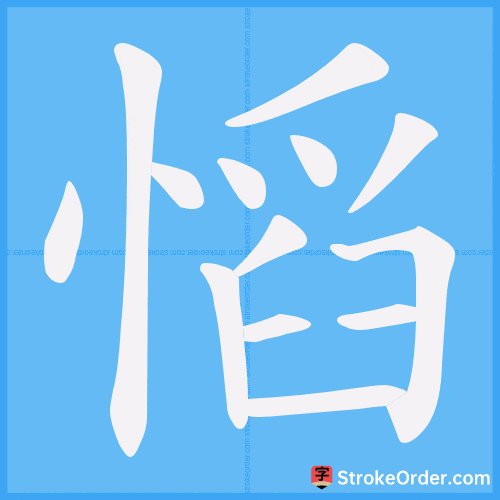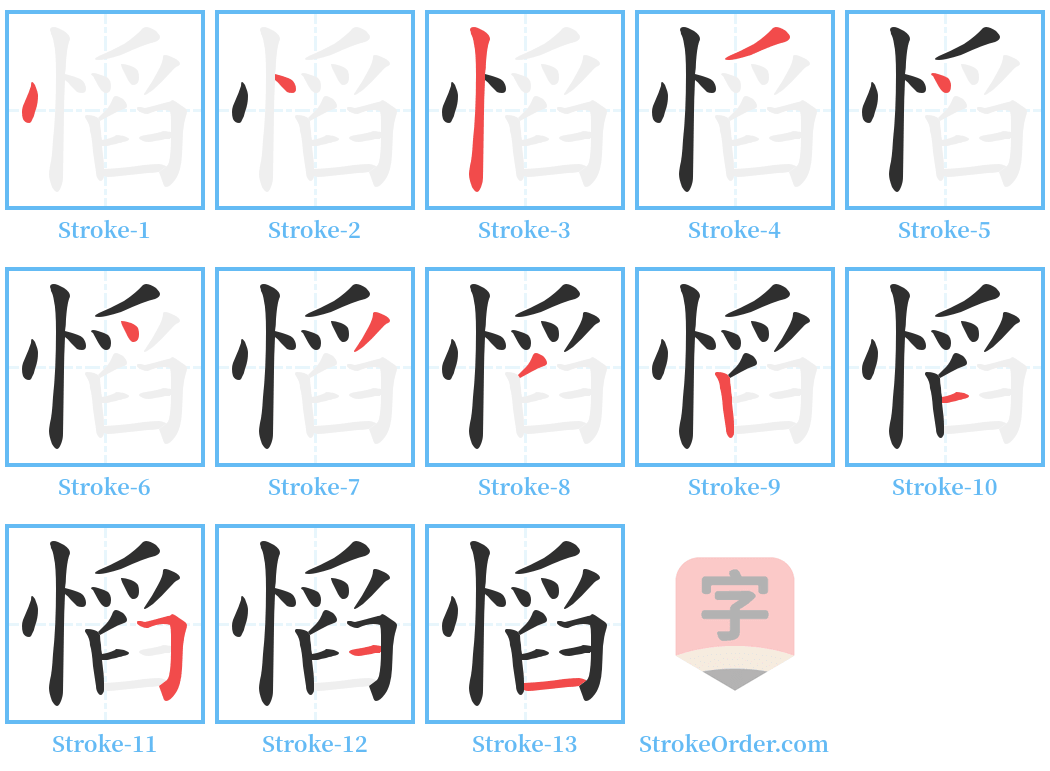慆 Stroke Order
Animated Stroke Order of 慆

Stroke Order Diagrams for 慆

Information of 慆
Pinyin
tāo
Radical
忄
Strokes
13 strokes
Usage
★★
Definition
慆 [tāo]
1. 喜悦:To feel joy.
2. 怠惰:To be lazy.
3. 怀疑:To doubt.
4. 消逝:To pass away.
5. 贪:To be greedy.
6. 古通“韬”,隐藏:In ancient usage, it means to hide or conceal.
慆 [tāo]
1. 喜悦:“君子之近琴瑟,以仪节也,非以~心也。” (Gentlemen approach the lute and zither for ceremonial reasons, not to joyfully feel.)
2. 怠惰:“~慢天命。” (To be lazy is to slight one's destiny.)
3. 怀疑:“天命不~久矣。” (Fate will not doubt for long.)
4. 消逝:“今我不乐,日月其~。” (Now I am not happy, as time passes.)
5. 贪。
6. 古通“韬”,隐藏。
慆 [tāo]
1. 同本义 (gladden)。
2. 隐藏;掩饰 (cover up)。
3. 怀疑 (doubt; suspect)。
4. 怠慢 (slight; cold-shoulder)。
5. 用同“叨”。贪 (be greedy for)。
6. 怠惰 (idle)。
引:
1. 《说文》:慆,说也。字亦作謟。 (From the Shuowen, it means to say; it can also be written as "謟".)
2. 《尚书大传》:师乃慆。注:“喜也。” (From the Book of Documents: The master rejoiced. Note: "To be joyful.")
3. 《左传》:君子之近琴瑟,以仪节也,非以慆心也。(From the Zuo Zhuan: Gentlemen approach the lute and zither for ceremonial reasons, not to joyfully feel.)
隐藏;掩饰 (cover up):
1. 《左传·昭公三年》:君日不悛,以乐慆忧。 (From the Zuo Zhuan: The ruler did not repent daily, covering worries with joy.)
怀疑 (doubt; suspect):
1. 《左传》:天命不慆久矣,使君亡者,必此众也。 (From the Zuo Zhuan: Fate will not last long; if the ruler dies, it must be among the masses.)
怠慢 (slight; cold-shoulder):
例:如:慆滥(怠慢放纵);慆慢(怠慢;怠惰) (For example: 慆滥 means to slight and indulge; 慆慢 means to slight or be lazy.)
贪 (be greedy for):
引:
1. 《资治通鉴》:不敢慆天之功,以干大赏。 (From the Zizhi Tongjian: Do not dare to be greedy for heaven's merit, in order to obtain great rewards.)
怠惰 (idle):
引:
1. 《书·汤诰》:无从匪彝,无即慆淫。 (From the Book of Documents: Do not straying from the norms, nor be lazy and indulge.)
例:又如:慆淫(享乐过度;放纵无度) (Also, 慆淫 means to indulge excessively; to be undisciplined.)